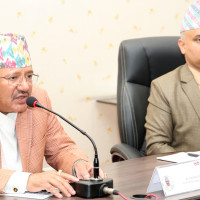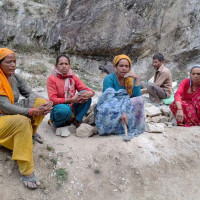- Tuesday, 17 February 2026
Democracy Must Deliver On Promises
Political and social forces of different hues and stripes are active in proving their rationale and meaning in the evolving political dynamics. Political groups showing their allegiance to the monarchy are actively seeking the restoration of the monarchical order in the country. They have announced their plan to launch agitations to press their demand in the following weeks. Teachers have ended their protest rallies after the government agreed to fulfil their demands. Similarly, resident doctors have launched strikes demanding a raise in their perks and allowances, which has been more or less sorted out. The issue of the appointment of the Governor for Nepal Rastra Bank has provoked unsavoury comments in the media.
Similarly, the delay in the formation of transitional justice commissions has come under public scrutiny. The incidences of corruption and abuse of power in high places have been widely discussed among the wider populace. A surge of popular discontent has indeed swept across the political landscape of the country. The interesting spectacle of the Nepali democracy is that the former King Gyanendra, who was edged out of the throne, has used the available democratic space to mobilise support and ventilate his grievances. The way democracy has malfunctioned, and political leaders have failed to deliver to fulfil the needs of the people, can be criticized, but the values and ethos of plural democracy cannot be faulted for any excuses.
Deepening of democracy
However, any intent and actions to roll back the basics of plural democracy cannot be justified on the pretence of poor delivery. Within the larger and accommodative arena of democracy and political plurality, different views, interests and groups co-exist, and they can use available space to articulate, organise and mobilise support for their own interests. However, the reversal of democratic values and ideals cannot innovate and curate the system. The remedies need to be pursued through the deepening of democracy itself. Needless to say, democracy is a demanding and process-based system. It is not just a mechanical condition like majority rule taken in isolation.
According to Nobel Laureate Amartya Sen, three different ways can make plural democracies relevant to enrich the lives of the citizens. First, political freedom is an inalienable virtue of democracy. Moreover, exercising civil and political rights is a crucial part of the lives of individuals as social beings, which democracy alone can nurture and bestow upon the people. Second, democracy has an important instrumental value. It offers space for raising claims to political attention to fulfil demands for social security and economic needs.
The practice of democracy allows citizens to learn from one another and helps society to form its values and priorities. Even the idea of needs, including the understanding of “economic needs,” requires public discussion and exchange of information, views, and analyses. In this sense, democracy has constructive importance. A proper understanding of what economic needs are –their content and their force – requires discussion and exchange. Political and civil rights, especially those related to freedom and open discussion, debate and dissent, are central to the process of generating informed choices. These processes are crucial to the formation of values and priorities. It is difficult to take preferences as given independently of public discussion and opportunity for choices.
Some who dispute the status of democracy as a universal value base their argument on the presence of contrasts of regional, cultural and social values. These alleged contrasts, according to Sen, are sometimes related to the poverty of some nations. According to this argument, poor people are interested, and have reason to be interested, in bread, not in democracy. This oft-repeated argument is fallacious, as history has shown that effective democratic governance alone guarantees the fulfilment of economic needs. The protective role of democracy is particularly important for the poor. It also applies to the destitute thrown off the economic ladder in a financial crisis.
People in economic need also need a political voice. Democracy is therefore not a luxury that can await the arrival of general prosperity. There is very little evidence that poor people, given the choice, prefer to reject democracy. There are arguments marshalled on behalf of the governments of South East Asian nations like Singapore and Malaysia, contending that so-called Asian values contrast with alleged Western liberal democratic values. Likewise, some Western intellectuals characterise similar contrasts and contradictions from the other side in terms of oriental values. However, these contrasting propositions of the West and the East do not manage to dent and deride democracy’s claim to almost a universal value.
Universal value
Several issues discussed above make it clear that democracy is indeed a universal value accepted and applied in all kinds of social and cultural situations. The value of democracy includes its intrinsic importance in human life, its instrumental role in generating political incentives, and its constructive function in the formation of values. These merits are not regional. Nor is the advocacy of discipline or order. Heterogeneity of values seems to characterise most, if not all, major cultures. The cultural argument does not foreclose, nor indeed deeply constrain, the choices we can make for democracy. Sen emphasises that the choice for democracy has to be made taking note of its function, roles and values.
The force of the claim that democracy is a universal value lies, ultimately, in that strength. Democracy, therefore, cannot be disposed of by imagined cultural taboos or assumed civilisation predispositions imposed by our various pasts. Any debate regarding the pros and cons of pluralism and democracy in Nepal should take cognisance of the values and perspectives endowed with it. Counterproductive arguments against pluralism, constitutionalism and democracy do not hold any sense and logic in the contemporary democratic world.
(The author is presently associated with Policy Research Institute (PRI) as a senior research fellow. rijalmukti@gmail.com)














